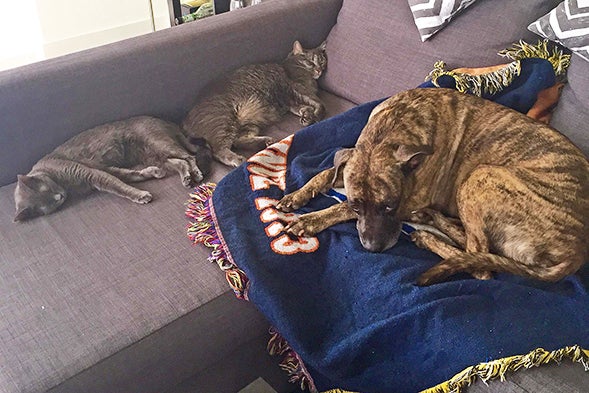
Heart Murmurs in Pets May Be a Sign of More Serious Medical Conditions
Like humans, your pet may be at risk for heart disease, and it’s important to recognize the signs of potentially dangerous heart conditions. Some heart diseases in pets may begin with a murmur—an abnormal heart sound caused by turbulent blood flow—heard through a stethoscope.
Cherry, a kitten the ASPCA rescued last fall in a Brooklyn hoarding case, was just one month old when veterinarians at the ASPCA Animal Hospital (AAH) discovered she had a heart murmur.
An echocardiogram—a specialized ultrasound of the heart—showed Cherry’s left and right heart chambers were dilated. She was placed in a foster home and rechecked a few months later, when a follow-up echocardiogram showed that Cherry’s heart had normalized.
“Heart murmurs are often our earliest warning that a heart condition may be present,” says Dr. Sharon Huston, a veterinary cardiologist often called on by the ASPCA Animal Hospital to provide cardiac consultations. But not all murmurs reveal the same prognosis. “In dogs, murmurs are more accurate predictors of the presence of heart disease,” said Dr. Huston. “But cats are more like people: the presence or absence of a murmur is not as accurate a predictor. Some cats with severe heart disease have no murmur at all, while most dogs with heart disease have a murmur.”
An echocardiogram performed by a veterinary cardiologist is necessary to determine whether heart disease is present and requires treatment.
"Unlike heart disease in humans, cholesterol and obesity don’t contribute to heart disease in animals,” said Dr. Huston. “Although there are situations where improper diet can lead to heart disease, most cardiac conditions in dogs and cats are genetic, and different breeds are prone to different heart problems.”
In addition, Dr. Huston says heart conditions in dogs and cats that are caused by emaciation or inappropriate food—often identified by the ASPCA in neglect or cruelty cases—can be resolved with proper care.
Cherry is fortunate not to have heart disease, but other causes of murmurs are not always benign and must be treated. In cats, a heart murmur can indicate disease of the heart muscle (cardiomyopathy), the most commonly-acquired heart disease in cats.
“Studies suggest that 30 to 50% of cats with a murmur have structural heart disease,” says Dr. Huston. “10% of all dogs have heart disease, which increases to over 60% with advanced age.” In dogs, a heart murmur may indicate a leaky valve, abnormalities of the heart muscle, congenital heart disease or a non-cardiac condition like anemia.
Congestive heart failure, which occurs when the heart muscle isn’t pumping blood as effectively as it should, is the most common emergency caused by heart disease in pets. Those animals require hospitalization and 24/7 monitoring and oxygen therapy.
Signs of congestive heart failure in cats include a fast breathing rate, difficulty breathing, fainting, weakness, lethargy, hiding and a decreased appetite. Often times, cats will experience a sudden crisis, such as paralysis or collapse, which can be caused by a blood clot. In dogs, signs may be more gradual, like a cough (especially a cough at rest), rapid breathing, fainting, lethargy or exercise intolerance.
“Congestive heart failure is a treatable condition,” says Dr. Huston. “With proper management, pets can continue to live good lives at home with their families.”
After Cherry’s positive re-check, Dr. Huston recommended another follow-up when she is full grown. But so far, so good. And her story has another positive ending: Cherry—now Zoe—was adopted by Ellen Vancelette, a Forensic Administrator at the ASPCA who has previous experience as a veterinary cardiology technician.
Now living happily with Ellen as well as her other cat, Polly, and a dog
No comments:
Post a Comment